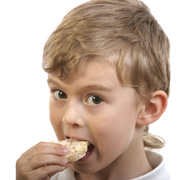 Preschoolers’ smiling teeth do more than just bring joy to the people who see them. Preschoolers’ teeth also help them chew and speak, and they create space in the jaw for adult teeth to grow in straight. Unfortunately, these “baby teeth” are also prone to early childhood caries or baby bottle tooth decay, also known as cavities.
Preschoolers’ smiling teeth do more than just bring joy to the people who see them. Preschoolers’ teeth also help them chew and speak, and they create space in the jaw for adult teeth to grow in straight. Unfortunately, these “baby teeth” are also prone to early childhood caries or baby bottle tooth decay, also known as cavities.
How do preschoolers develop cavities? As in adults, children’s mouths are filled with bacteria. Whenever a child consumes sugar or starch, the bacteria feed on the sugar, releasing acid as a byproduct. This acid can break down the outer layer of the tooth, creating cavities.
So, how can parents ensure that preschoolers’ teeth stay healthy? Here are some tips:
* Keep preschoolers’ teeth clean. By the time a child has reached age 2 to 5, they should be on their way to caring for their own teeth. By age three, they should have a full set of baby teeth. Most children at this age will want to brush their teeth on their own, but it is important to supervise and help them until they are doing it correctly. Do a quick follow-up brushing if necessary with a soft-bristled tooth brush.
* Use probiotics. Oral care probiotics can be an effective step in a preschooler’s oral care routine. If left unchecked, bad
bacteria can overwhelm the mouth, possibly leading to tooth decay. EvoraKids (www.myevorakids.com), a chewable containing a special blend of oral care probiotics designed for children, works by flooding the mouth with good bacteria, which adhere to tooth surfaces, including crevices, pits and fissures in the chewing surfaces, helping to promote happy smiles. It supports tooth health by balancing the bacteria in the mouth.
* Limit sweets. Sugar produces an acid that removes calcium from teeth, thereby breaking down the enamel. Only give children fruit for snacks, not cookies or crackers with refined sugar. If you do keep sweets in your house, only give children candy that they can consume all at once. Always make them brush their teeth soon after eating candy to remove any sugars that may still be sitting in the mouth.
* Avoid sharing silverware with your child. Never put your mouth on anything that will enter your child’s mouth — children aren’t born with destructive bacteria in the mouth, they catch them from mom and dad.
Please feel free to share this article with your friends and family and like us on Facebook. At Carlos and Parnell, M.D., P.A. our professional and caring staff makes the difference with patient care.
NewsUSA










